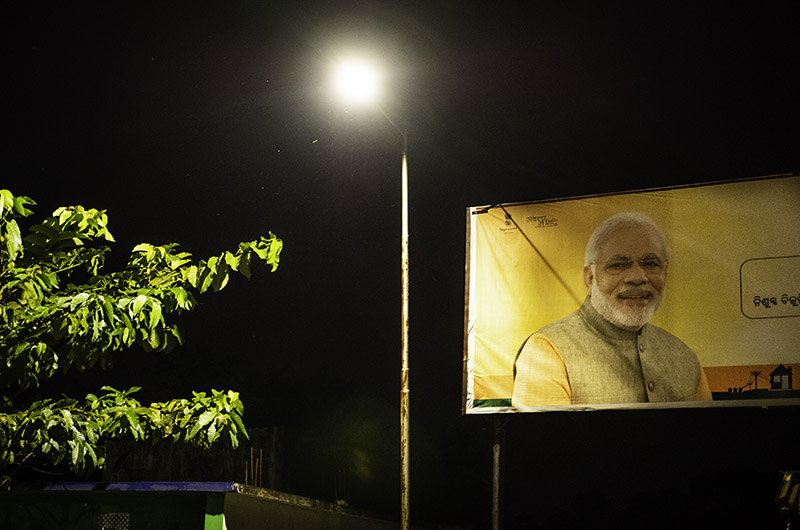By Jay Church
4/18/2024 India (International Christian Concern) — A half-finished Hindu temple consecrated to much fanfare, built on the site of a mosque dating back to the 16th century. A Sikh leader in exile assassinated on Canadian soil. A suite of laws targeting Muslim citizens and stripping them of their citizenship. A patchwork of laws empowering angry mobs who attack and disband peaceful church services.
In the months leading up to its national elections, the world’s largest democracy has been dramatically trampling religious freedom on its path to radical Hindu nationalism.
As India prepares for national elections, slated to begin on Friday and continuing into May to allow an estimated 969 million voters to participate, many see Prime Minister Narendra Modi’s religious theatrics as designed to whip up the Hindu nationalists who make up the core of his voter base.
A Forgone Election
Coming into this week’s election, Modi enjoys immense popularity. With his approval rating hovering around 75%, he is considered the most popular leader in the world. This would be his third term, built on two previous terms replete with concrete and inflated successes in his supporters’ imaginations.
Modi’s overwhelming popularity bodes well for him. The Bharatiya Janata Party (BJP), which Modi leads, only required 31% of the vote to win the majority in Parliament in 2014, the year Modi first came to power. It won 37% of the vote in 2019, allowing it to advance its broad agenda. This year is expected to bring another resounding victory for the BJP.
The Congress party—the BJP’s main political rival—suffered a series of resounding defeats in November, halting what some had heralded as a rising drumbeat of serious political opposition. That drumbeat now seems to have faded into the noise of a political scene featuring more than 2,600 parties.
Political Theater
If Modi is overwhelmingly popular and faces a national election with no real opposition, why the theatrics? Why does he need to whip up his base by deepening religious tensions?
If one can look past the celebratory military helicopters dropping flowers on desecrated religious sites, an alternative explanation comes into focus — Modi knows he has won and is running a victory lap on the increasingly tattered remains of religious pluralism his country was once known for.
Modi is not whipping up the crowds when he coyly denied assassinating Hardeep Singh Nijjar in British Columbia — he is repaying them. He is not pandering for votes when he uses religion to threaten disenfranchisement for a whole swath of voters just weeks before national elections — Modi is celebrating the votes he has already.
There is a historical precedent for this habit of celebrating victories by diminishing India’s religious minorities and their standing in Indian society. In 2019, almost immediately after winning reelection, he stripped Jammu and Kashmir, the only region in India without a Hindu majority, of its constitutionally guaranteed special autonomous status.
The move hardly surprised observers, particularly his Hindu nationalist voter base. Modi was simply delivering on his promises, celebrating the mandate handed to him by supporters who had grown used to giving up the freedoms of others in exchange for the ability to cash in on decades of growing nationalistic furor.
Just months after his move on Jammu and Kashmir, the Modi-led government passed the Citizenship Amendment Act (CAA). Explicitly targeting Muslims for exclusion from new, easier paths to citizenship, the CAA neatly disenfranchises Muslims while giving persons of other faiths an easy way around the broad threat posed by citizenship tests.
After unexpected electoral wins for his party in late 2023, Modi opened 2024 by consecrating the Ram Mandir temple in Uttar Pradesh, even though construction was far from finished on the temple complex being built on the site of a mosque demolished by a Hindu mob in 1992.
Refocusing the Conversation
In the perpetual cycle of elections in democratic nations, an incumbent who delivers on his campaign promises is often difficult to differentiate from one who panders for votes in the next election.
Perhaps the distinction is too fine to be worth teasing out. Amid all the noise and chaos of national elections in the world’s most populous country, it must be remembered that real people are suffering because of Modi’s stance on religion, no matter whether he is looking for votes or celebrating them.
The United States is afraid of pushing India on its dismal treatment of religious minorities because it fears losing what it considers to be a critical partner in countering China. India may come to the United States’ aid in a conflict with China, but that is far from guaranteed. Indeed, India has joined China in taking an active position on the other side in the United States’ struggle with Russia, buying more than 50% of the sanctioned country’s crude oil, up from about 1% in 2022.
Today, Modi’s crosshairs are on the country’s religious minorities. Whether Muslims, Sikhs, Christians, or members of another group, they represent a convenient bugbear for a leader with an increasingly narrow definition of what it means to be Indian.
In responding to the religious freedom crisis underway in India, the international community cannot allow Modi’s campaign of repression to become about the election. Rather, the narrative must remain on the concerning trend of religious nationalism sweeping India and on the religious minority communities trampled along the way.
For interviews, please email [email protected].



